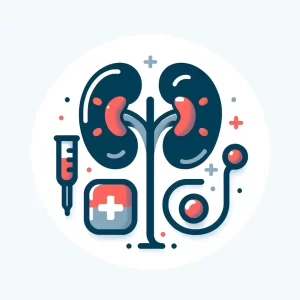Exploring the complexities of kidney stone disease, this article delves into the significance of the Kidney Stone 24-Hour Urine Test. Essential for diagnosing and managing this condition, the test offers crucial insights into one’s predisposition to kidney stones, aiding in preventive measures and personalized treatments.
Table of Contents
- Understanding the Genesis of the Kidney Stone 24-Hour Urine Test
- How This Test Interlinks With Your Health
- Role in Traditional and Functional Medicine
- Recognizing Common and Uncommon Symptoms
- Why Consider Ordering the Kidney Stone 24-Hour Urine Test
- Restoring Health Faster with Test Results
- Other Relevant Tests for Comprehensive Kidney Health
Key Takeaways
- The Kidney Stone 24-Hour Urine Test is pivotal in detecting kidney stone types and forming prevention strategies.
- It bridges traditional and functional medicine approaches, offering a holistic view of kidney health.
- Understanding the symptoms and risks associated with kidney stones is essential for early intervention.
- Complementary tests can offer a broader perspective on kidney health and potential complications.
- Quick link for ordering the 24-hour kidney stone urine test.
Different Types of Kidney Stones
Did you know there are several types of kidney stones? They’re like unwanted little rocks that can form in your kidneys. Let’s explore the different types!
Calcium stones: These are the most common. They occur when calcium combines with other substances, often oxalate (found in foods like spinach and chocolate) or phosphate.
Uric acid stones: These stones form when your urine is often too acidic. Eating lots of meat, fish, and shellfish can make this type of stone more likely.
Struvite stones: These can form after a kidney infection. They can grow quickly and become quite large, surprising you with how big they are!
Cystine stones: These are rare and occur in people with a genetic disorder that causes the kidneys to excrete too much of a specific amino acid (cystine).
Kidney stones come in various types, each with its own story. Calcium stones are the most common and are linked to certain foods. Uric acid stones come from too much acid in your urine. Struvite stones grow from infections, and cystine stones are a rare type caused by a genetic condition. Knowing these types helps doctors figure out the best way to treat them and prevent new ones from forming. The best part is that it can be tested for by a simple stone urine test.
The Creation of the Kidney Stone 24-Hour Urine Test
The Kidney Stone 24-Hour Urine Test was developed as a vital tool to understand the complex formation of kidney stones. This diagnostic measure aids physicians in detecting the specific stone types contributing to stone formation, a crucial step in developing effective prevention strategies.
This diagnostic measure aids physicians in detecting the specific stone types contributing to stone formation, a crucial step in developing effective prevention strategies.
Its inception roots in the need for more precise diagnostics beyond standard imaging, highlighting the test’s significance in modern medical practices.
How This Kidney Stones Test Interlinks With Your Health
Crucial in assessing kidney health, the 24-Hour Urine Test evaluates various markers critical in kidney stone formation. These markers provide insights into an individual’s risk factors, making the test integral in both prevention and management of kidney stone disease.
Through its comprehensive analysis, the test plays a pivotal role in maintaining renal health and preventing recurrent stone formation.
Role in Traditional and Functional Medicine
In traditional medicine, the test serves as a cornerstone for diagnosing and treating kidney stones, offering valuable data for customized treatment plans. Conversely, in functional medicine, it extends beyond diagnosis to explore underlying causes, emphasizing holistic health approaches.
Its versatility across different medical approaches underlines its importance in diverse therapeutic contexts.
| Lab Test Name | Measurement |
|---|---|
| Cystine Urine | Qualitative |
| Urine Volume | Preserved |
| Calcium Oxalate | Saturation |
| Calcium Urine | mg/24 hr |
| Oxalate Urine | mg/24 hr |
| Citrate Urine | mg/24 hr |
| Calcium Phosphate | Saturation |
| pH 24 hr Urine | pH |
| Uric Acid | Saturation |
| Uric Acid Urine | Saturation |
| Sodium Urine | mmol/24 hr |
| Potassium Urine | mmol/24 hr |
| Magnesium Urine | mg/24 hr |
| Phosphorus Urine | mg/24 hr |
| Ammonium Urine | mmol/24 hr |
| Chloride Urine | mmol/24 hr |
| Sulfate Urine | meq/24 hr |
| Urea Nitrogen Urine | g/24 hr |
| Protein Catabolic Rate | g/kg/24 hr |
| Creatinine Urine | mg/24 hr |
| Creatinine/Kg Body Weight | mg/24 hr/kg |
| Calcium/Kg Body Weight | mg/24 hr/kg |
| Calcium/Creatinine Ratio | mg/g creat |
According to PubMed, roughly half of all symptomatic renal calculi could be prevented with proper diagnosis and treatment of underlying chemical stone-promoting risk factors. The 24-hour urine test for nephrolithiasis is crucial, yet underutilized, in recurrent nephrolithiasis medical evaluation and prophylactic therapy.
Recognizing Common and Uncommon Symptoms
Kidney stone formation often presents through various symptoms, ranging from acute pain to urinary disturbances. Recognizing these symptoms, both common and uncommon, can prompt timely intervention, underlining the test’s diagnostic importance.
Understanding these symptoms aids in early detection, essential in preventing more severe complications.
Why Consider Ordering the Kidney Stone 24-Hour Urine Test
This test is crucial for anyone experiencing symptoms of kidney stones or with a history of such conditions. It provides a detailed assessment, aiding in both preventive strategies and effective treatment planning. It’s also a kidney stone urine test, so it can be completed at home and mailed back to the lab.
Ordering this test can be a proactive step in managing one’s renal health, especially for those at higher risk.
Restoring Health Faster with Test Results
The test’s results offer actionable insights, allowing for rapid implementation of tailored strategies to restore and maintain kidney health. Timely adjustments based on these results can significantly reduce the risk of recurrent kidney stone formation.
Thus, it is not only a diagnostic tool but also a roadmap to quicker health restoration since it can be used over time to make sure treatment is working.
Other Relevant Tests for Comprehensive Kidney Health
For a thorough kidney health assessment, additional tests such as complete urinalysis, CBC, and CMP should be considered. Consult with your treating physician for a full workup.
Available for ordering at TrueHealthLabs.com, these tests form a comprehensive toolkit for kidney health management.
Kidney Stone 24-Hour Urine Test – FAQs
What is the purpose of the Kidney Stone 24-Hour Urine Test?
This test is designed to evaluate various markers in urine that contribute to the formation of kidney stones, assisting in both diagnosis and prevention strategies.
Who should consider taking this test?
Individuals experiencing symptoms of kidney stones or those with a history of such conditions should consider this test for effective management and prevention of recurrence.
What can be learned from the test results?
The results provide detailed insights into an individual’s risk factors for kidney stone formation, aiding in tailored treatment and preventive measures.
How does this test differ in traditional and functional medicine?
In traditional medicine, it’s a diagnostic tool, while in functional medicine, it’s used to explore underlying causes and promote holistic health.
References
-
- Leslie, S.W., Sajjad, H., & Bashir, K. (2023). 24-Hour Urine Testing for Nephrolithiasis: Interpretation and Treatment Guidelines. In StatPearls [Internet]. StatPearls Publishing. Available at: NCBI Bookshelf



